
Is Google’s Local Pack a Survival Kit for Local Businesses

Alexandra Tachalova
February 1, 2017
Is Google’s Local Pack a Survival Kit for Local Businesses
Written in collaboration with Alexandra Tachalova – LinkedIn
The AccuRanker team and I analysed more than 300,000 local SERPs in the largest US cities – New York, Los Angeles and Chicago – to get a clear answer to the question:
Are Google local packs a survival kit for local businesses? What is the proportion of local and global businesses that appear in Google local packs?
This research wouldn’t have been possible to conduct without the amazing AccuRanker API, which is able to process a massive amount of data less than an hour! The result of this analysis would be interesting both for search marketing experts who provide local SEO services and for business owners.
In addition to the results of my extensive research, I’ve also included expert opinions, as I distributed a questionnaire among the most respected local SEO pros.
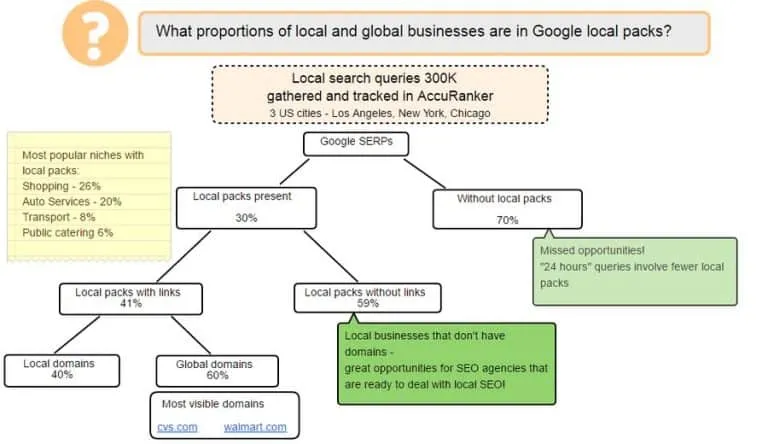
Why is local SEO a big deal?
63.6 percent of experts confirmed that local search delivers a better ROI than all other online channels
For all businesses – SMEs and large companies – local SEO is a vital concern. If you are a business owner or a manager running SEO processes, you should put your effort into getting the maximum number of advantages out of the possibilities local search opens up for your business.
And what is the desired effect?
Depending on how relevant your business is to a particular search query, your domain should appear in local pack listings, and in the first lines of Google SERPs. On August 2015, Google opted to show three results instead of seven in local packs, so it is quite difficult to get into them.
But there’s plenty of bigger brands than mine. Can I compete with them in local packs?
It is evident that small businesses cannot afford to invest the same amount of resources as big companies do for local search optimisation. And, as a result, small businesses can’t have the same number of links and other SEO signals that push their sites higher in local packs. Google local listings are partly solving this issue when it comes to local results that include concrete locations. But let’s imagine a situation where your local business has a bunch of global brands located near it. How will the local results be prioritised in this case? Will your business still be visible? Let’s go deeper to learn answers to all these questions so that you can opt for the best local SEO strategy for your business!
How did we crunch the numbers?
Together with the AccuRanker team, I conducted research to monitor the competition among global and small businesses in Google local packs.
Here are the main steps that we took to get a list of final insights:
- We gathered more than 111,000 local keywords with the help of AccuRanker’s keyword suggestion feature and Google Keyword Planner – those that included words like “near me,” “around me,” “nearby,” etc.
- Next, we grouped all keywords in categories like real estate, shopping, financial services, public catering, sports, healthcare, auto services and others; the clusterisation was delivered partly with the help of Google Keyword Planner, but most of the work was done manually.
- After this, the AccuRanker team set up position tracking campaigns for those keywords for the three largest US cities – Los Angeles, New York, and Chicago. It is worth mentioning that AccuRanker has outstanding capabilities – it can track more than 300,000 keywords via API in only 30 minutes! I have never come across such a capability in my experience.
The raw datasets that we received, in the end, were represented in the list of domains and the first three results of company names or websites that appear in local packs in New York, Los Angeles and Chicago. With the help of keyword categorisation, I was able to analyse not only general trends but also dig deeper and see how local businesses are performing in various industries.
Here are my top 10 insights:
1. More than 60 percent of local packs are occupied with global domains
Global vs. local domains
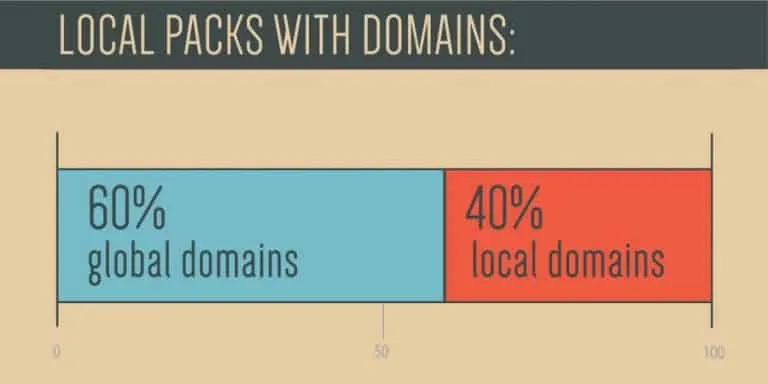
I divided the list of domains that appear in local packs into two groups: global and local ones. In order to check the traffic of more than 36,000 domains, I used data provider traffic metric.
So, here is the bad news for small local businesses:
More than half of the domains that appear in local packs are not local at all
The overwhelming majority of local packs across the different niches I analysed are occupied with big international businesses’ sites.
As we’ve already discovered that local businesses often don’t have websites, then it’s quite predictable that global domains can take advantage of this situation. Also, the experts we consulted stated that among the biggest issue that local businesses face is that big brands and giant domains are dominating local SERPs:
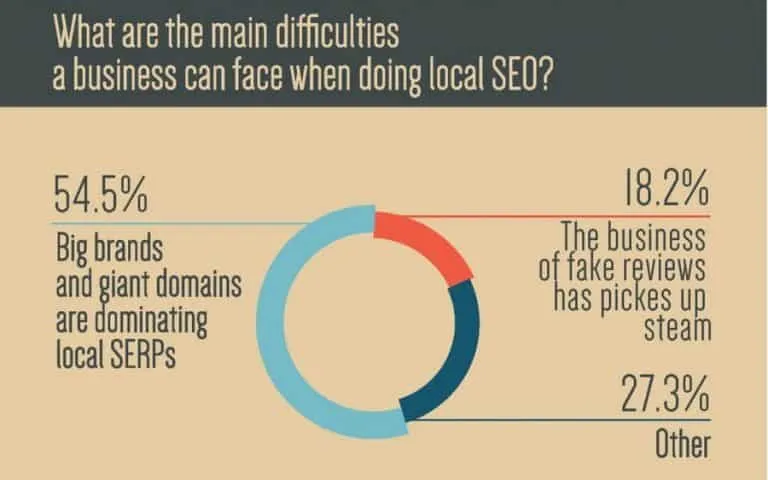
2. The shopping category shows the biggest presence of global domains in local packs – more than 53 percent
Global domains are powerful; they have impressive link profiles, and Google trusts them. That’s why global domains have a number of benefits compared to small businesses’ domains, even on a local scale.
3. The shopping, auto services, transportation and public catering categories have the highest number of SERPs with local packs
Here is the distribution of those four niches:
- Shopping is leading here. It occupies around 26 percent of local searches that include local packs
- Auto Services is the second leading niche, which occupies 20 percent of local searches that include local packs
- Transport occupies around 8 percent of local searches with local packs
- Public catering – 6 percent of local searches with local packs
4. Walmart and CVS are the top most visible domains
Despite the fact that the number of local searches related to the healthcare niche is way lower compared to the shopping or automotive niches, there is one strong leader. CVS appears in more than 15 percent of healthcare local searches more than 15 percent of health care searches.
Is cvs.com really such a powerful domain? I checked its rivals with the help of a competitive intelligence tool. Here they are, the most relevant competitors of cvs.com in organic search: walgreens.com, drugstore.com, riteaid.com, and rxlist.com. Rxlist.com is an online medical resource that contains information mainly for patients’ own education, which is why it coincides with cvs.com in terms of shared keywords but is not a real competitor for a drugstore chain, which CVS is. Drugstore.com is an online shop for vitamins and beauty products, so it is not one of CVS’ direct competitors. Walgreens and Rite Aid are drugstore chains like CVS, so they are direct rivals.
After checking that, I turned to AccuRanker, which allowed me to add competitors and see how they’re performing in a local result by selecting a set of keywords and a certain location. I decided to check how cvs.com and its competitors are appearing in SERPs for the different medicine-related keyword in Los Angeles. The chart below shows the visibility of cvs.com as well as its main rivals:
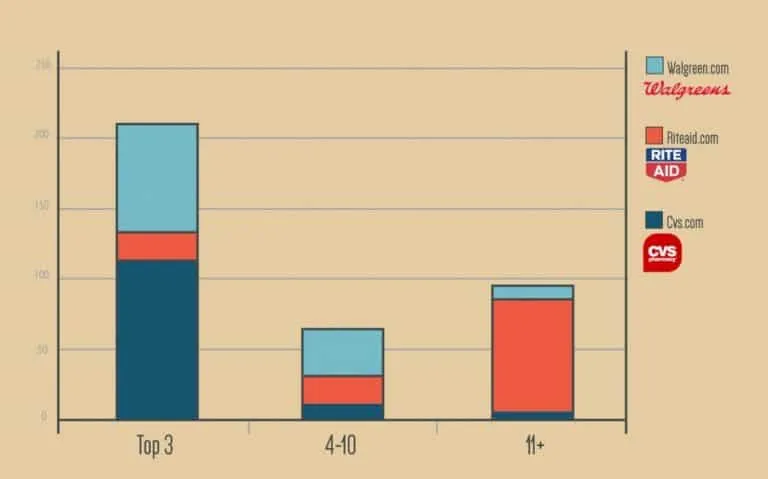
As for the second leading domain in local search, Walmart has gained such a high visibility because of outstanding brand awareness – it has 90 percent of branded searches. For instance, one of Walmart’s direct competitors in both online and offline markets, the Target Corporation, has three times less branded searches. So, this only proves that having a strong brand is a winning strategy. However, when we were analysing our data, we discovered a case that was the opposite of Walmart’s. The liquor store Warehouse Wines & Spirits shows up a lot in general searches and it has less than four percent of branded searches. So, even without a strong brand awareness, you can become extremely visible!
5. The presence of local packs for local search queries in Google SERPs doesn’t exceed 30 percent.
Yes, this is true. Only 30 percent of Google SERPs for local searches show local packs. This means there are plenty of opportunities for local business to take advantage of this situation. No matter what niche your business belongs to, Google offers local listings, and being included in them is officially free.
6. A huge number of searches that don’t involve local packs are related to various topics that contain “24 hours”
I simply can’t believe that in giant cities like NY, LA, and Chicago, there’s no 24-hour cafés, groceries, gyms and supermarkets! The queries that include the words “twenty-four hours” are evidently local as well. So, there is room for SEO action for many local businesses that are open around the clock.
7. Accommodation-related search queries include local packs in more than 95 percent of analysed SERPs
Despite the small presence of local packs across all analysed SERPs, the accommodation category is covered fully. Looking at the results of my research, it seems, to me, to be among the most competitive niches. However, the expert survey revealed reveals that this is not the case.
SERPs for most accommodation search queries (for example, “cheap hotels near m”, “best places to stay near me” or “comfort inn near me”) show local packs. At the same time, among these local packs that appeared, only 36 percent of them included local businesses.
8. Legal and beauty services are among the most competitive niches, as legal and beauty local search queries have the lowest number of SERPs without local packs
Local SEO experts confirmed that both legal services and real estate are the two niches where competition is quite hard. Legal services have a high competition level simply because the number of searches is really small. That’s why it’s really hard to stand out in this niche. We asked AJ Ghergich, founder of Ghergich & Co., a consulting agency in Saint Louis, Missouri, to comment on the situation with legal services niche:
AJ Ghergich
SEO & Content Marketing Expert, ghergich.com
To me legal is the most competitive simply because of scarcity. For example, keywords like “personal injury attorney nyc” cost upwards of $70 to $80 per click in Google Ads. The search volume is low but the ROI on the right client is sky-high.
So you have a ton of competition for a very small available search volume. Combine that with deep pocketed and sometimes ego-driven lawyers and you have your work cut out for you.
9. A majority of local businesses still prefer to maintain a minimum web presence
I assume this is due to the complexity of proving a direct connection between online visits and actual purchases. That’s why business owners are trying to avoid going online. Also, not all businesses are aware of using Google Local listings if they do not have websites.
10. Only 41 percent of local packs that appear in Google SERPs have domains
Local pack with and without domains
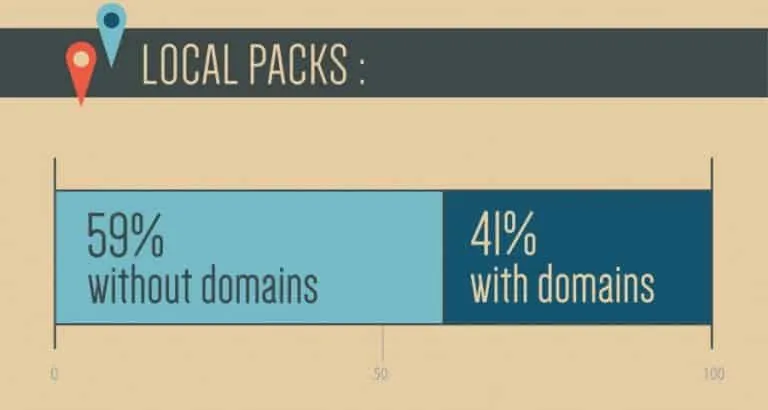
Even those businesses that are aware of Google options for local businesses, very often choose not to create a website. Among all the local packs that appeared in SERPs for local search queries, only 41 percent include links to a business’s site. So, a huge number of local businesses just do not consider forgoing a website a real problem. They simply do not understand what kind of opportunities and profits digital marketing is capable of generating. This is sad, but, on the other hand, it’s left a huge gap open for digital agencies that are ready to work with local and hyper-local businesses. They can easily reach out to those businesses and recommend developing a website and running a local SEO campaign.
It’s obvious that there’re plenty of opportunities for local businesses to take advantage of this situation and become a bit more visible online. On top of this, the local SEO experts we consulted also claimed that ANY local business MUST have its own site!
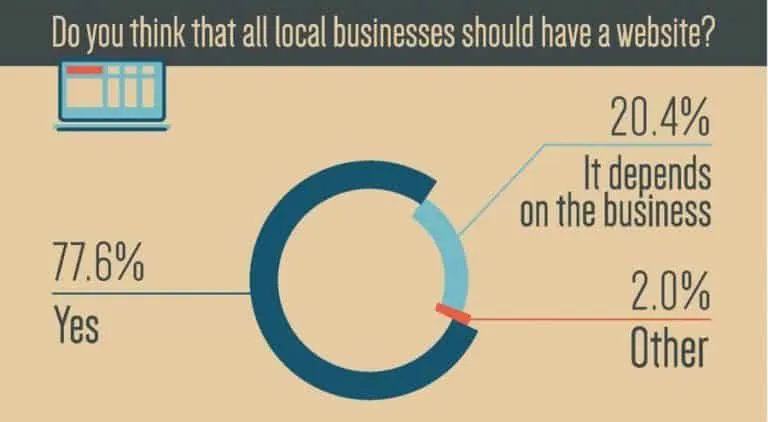
So, if you run a local business and you still have insufficient knowledge about how your business can benefit from digital marketing, then it’s the perfect time to get a better understanding of it.
One of the most pressing issues for all businesses is budgeting. How much does local SEO campaign cost on average? How much should I invest in it? You’re probably asking yourself these questions now. Well, I can help you answer the first one. Here is a graph from our expert survey, which shows that it usually costs between $1,000 and $2,000 for a client to buy a local SEO campaign.

As for the second question, it still for you to decide.
To sum everything up
- Small businesses have a 40 percent chance of becoming visible in Google local packs in the top three results! The goal of becoming visible in Google if you are a local business is reachable, but it can’t be solved solely by submitting your company to Google local listings. The reason is simple: local packs are flooded by global domains (around 60 percent).
- Among the most competitive local niches are accommodation, shopping, legal services, and beauty services. If your business belongs to one of these niches, you’d better hire a real professional with a solid expertise in local SEO. We recommend that you begin your research by consulting some of the same experts that participated in our survey
- Almost 60 percent of local business listings don’t have domains, which means there are plenty of opportunities for SEO agencies and freelancers. This also means that the majority of local businesses still do not even have websites! Moreover, around 70 percent of Google SERPs for local search queries do not show local packs at all.
So, if you run a local business, or you are a local SEO professional, you should pay close attention to the opportunities the local scene can provide for you.
View the complete infographic here.
Do you have any other comments, thoughts or ideas? Have you ever faced the same or other challenges as an SEO expert or local business? I’m really excited to hear from you, so please leave your comments right now!
Thanks to our data partners:
Related blog posts
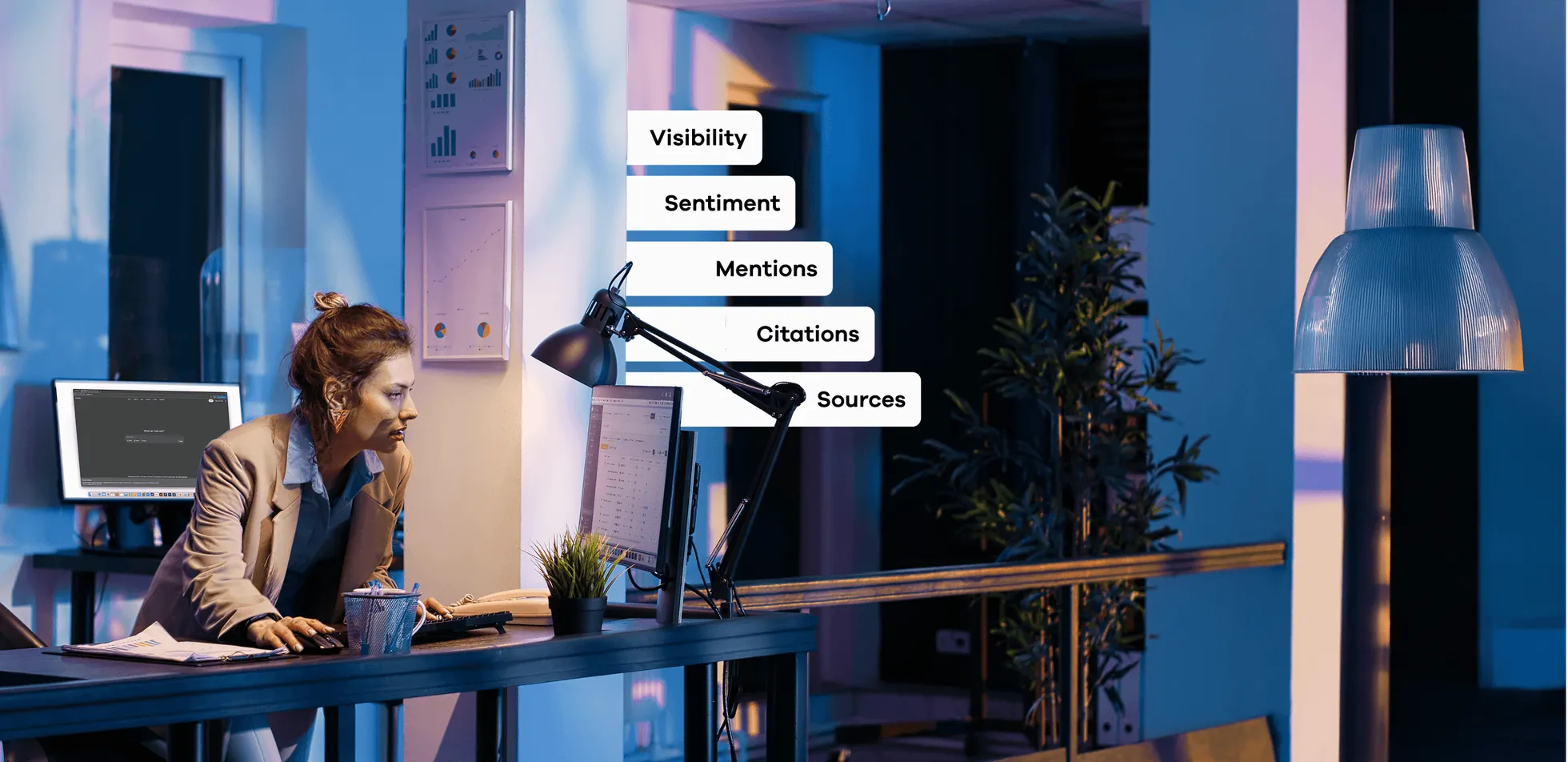
5 LLM Visibility Metrics You Should Track in 2026
SEO is now both about ranking in search engines and being visible in LLMs. We give you five visibility metrics every SEO should track in 2026.
3 December 2025Is LLM Tracking Relevant for You?
LLM tracking is not just for SEOs. It is also relevant for content teams, agencies, marketing leadership, and communication teams. Learn why here.
26 November 2025
How to Find the Best Prompts to Track for AI Visibility
Do you want to start tracking prompts to optimize your AI visibility? We give you seven practical ways to identify relevant prompts to track in LLMs.
9 November 2025
